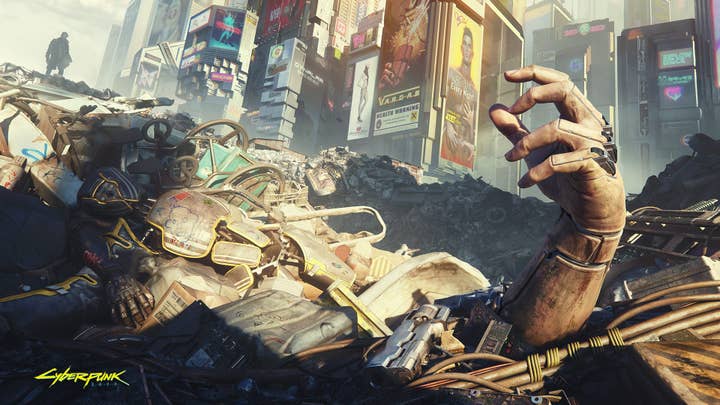Cyberpunk 2077 launches with some real dystopia in tow | Opinion
Nobody should be pleased that CD Projekt Red's most notable innovation is pushing consumers to buy its new game entirely sight unseen
With the possible exception of Rockstar's inevitable sequel to Grand Theft Auto 5 -- whatever form that eventually takes -- there's probably no game in history that has carried quite such a weight of consumer and commercial expectation as CD Projekt Red's follow-up to The Witcher 3.
In the five years since the company perfected its Witcher formula, the game has come to be rightly celebrated as a high point not just of that entire generation of games, but of RPGs generally - so much so that even a Switch release four years after the fact was greeted like an old friend by players, and the promise of next-gen updates to the game has some people positively giddy. If CDPR had moved straight on to doing another Witcher game, anticipation would have been enormous; shifting instead to a neon-tinged game based on the Cyberpunk role-playing system dialled that anticipation up to fever pitch. If the studio could only do for players' William Gibson and Philip K. Dick fantasies what it had done for their medieval swords and sorcery fantasies, this game would be a landmark for the industry.
To be clear; it probably is a landmark for the industry. CDPR's extraordinary world-building and story-spinning prowess is an impressive thing to behold, by all accounts, and in the end it's likely that Cyberpunk 2077 will live up to much of its promise, just as The Witcher 3 did. Not all industry landmarks, however, are to be quite so easily celebrated -- and the launch of Cyberpunk 2077 is establishing a few precedents and lines in the sand which we may all come to regret in the coming years, no matter how much fun we end up having in Night City.
The launch of Cyberpunk 2077 is establishing a few precedents which we may all come to regret in the coming years
To be specific, Cyberpunk 2077 is doing something that no other major game I can recall has ever done, and demanding something of its players that even the industry's most famously consumer-unfriendly publishers have never quite dared to; it's asking a very large proportion of its customers to buy the game sight unseen. Pre-launch, not a single outlet -- traditional press, streamers, YouTubers, nobody -- received code for the console versions of the game. Those who reviewed the PC version, meanwhile, signed an NDA which meant that they couldn't upload any footage in their video reviews other than the b-roll provided by CDPR itself.
The company pretty militantly enforced these rules, cracking down on any unauthorised video of the game that appeared online, which is absolutely their legal right -- though they also overstepped the mark in bringing down the DMCA hammer on people commenting on the game who hadn't signed an NDA or used any footage. But the net result is that by the time the launch rolled around, no console player had seen a single second of footage of how the game would play on their system. No PC player had been able to judge for themselves how the game looked on differently specified PCs, or how bad the bugs and glitches averred to by reviewers actually were.
This draconian approach to information control ahead of the launch of the game would beg the question "what don't they want you to see?" under any circumstance -- and even if the console versions ultimately turn out to have been fine, that's not a question a publisher should be begging. As footage and commentary on them seeps through even as I'm writing this, though, it appears that the console versions are very much not fine at all -- which means that the heavy-handed NDAs and refusal to provide any console code at all amounts to CDPR deliberately trying to cover up a major problem with its game that it was fully aware of and didn't want consumers to know about ahead of launch.
By launch, no console player had seen a single second of footage of how the game would play on their system
Why this has happened is no great mystery. Cyberpunk 2077 was originally meant to launch in April, and was delayed for eight months -- which is fine, and indeed often welcome if it means a better game is ultimately released. During that eight months it's been dogged by reports of long-term crunch conditions at the development studio, which is far less fine, and usually a sign of more deep-rooted management and quality problems. Now it's launching: with a sky-high Metacritic score made up entirely of the assessments of outlets willing to sign a restrictive NDA and post video reviews made up entirely of cherry-picked marketing footage; without console players getting the slightest inkling of what it'll look like on their systems; and with the trickle of rumours of major bugs and glitches turning into a flood over the course of its first few hours of availability.
CDPR is a critical darling, and for good reason, but in recent years we've seen a torrent of games from prestige studios that nonetheless had buggy, half-finished releases. Mass Effect Andromeda and Assassin's Creed Unity were widely mocked for major visual glitches and bugs, but many consumers seemed to have lost their sense of humour about this kind of thing once Anthem, Fallout 76 and Marvel's Avengers came along. We've reached a point where, sadly, nobody should be taking the claims of game publishers on faith -- and nor should game publishers be asking them to.

Never before has there been such a diversity of gaming media out there -- websites, video channels, streamers, you name it, many of them addressing specific audiences or covering specific genres. There's no legitimate reason for a studio to say "nah, we're not going to let you see anything, but you can trust us, right?" The precedent being created here -- probably the biggest AAA release of the year heading out into the wild without anyone getting to kick the tyres and check the oil -- is a hugely anti-consumer move.
It's probably happening, to some extent, because CDPR knows it'll get away with it. If EA or Activision did something like this, consumers would be up in arms, but the fuzzy warm halo of everyone's affection for The Witcher surrounds CDPR like a snug blanket -- for now, at least. To a larger extent, though, this is happening because CDPR made an extremely poor and short-sighted decision a few years ago, when riding high on the success of The Witcher 3 -- it listed itself on the Warsaw Stock Exchange.
Another delay, no matter how warranted, could wipe literally billions of dollars off the company's stock price
That move has certainly made some people very rich. Earlier this year the company surpassed the valuation of Ubisoft, which is pretty extraordinary for a company with one (licensed, not fully owned) franchise and an unproven new (licensed, not fully owned) title on the way. However, CDPR's valuation bubble -- which gives it a P/E ratio that would be eye-watering even for most Silicon Value companies -- is largely driven by anticipation of Cyberpunk 2077's performance, and that means decision-making on when to launch and how long the game could be delayed was being driven by factors that weren't a question of what would best serve the game or its consumers.
Another delay, no matter how warranted, could wipe literally billions of dollars off the company's stock price. This is the reality for companies which float on the stock market despite having a product release schedule that really only encompasses one major release every few years, rather than the nice quarterly rhythm that makes investors comfortable. Decisions start being made for the wrong reasons, because balancing the needs of the game you're creating against the requirement to keep your investors optimistic and happy is extremely difficult, if not impossible.
Stock market listings inevitably create a degree of short-term thinking that doesn't serve a development studio well. In this case, it seems likely the CDPR is about to burn through a pretty significant amount of the consumer goodwill it built up with The Witcher 3 in this poorly judged effort to keep investors happy by launching an unfinished game and then using aggressive means to prevent players from knowing about the problems pre-launch.
I can only speak for myself, but my finger hovered over the purchase button on the Xbox app this week. Cyberpunk 2077 is one of the reasons I pre-ordered an Xbox Series X, and the smart delivery feature (which is great) means I could have bought it in work and been playing it that evening. It was hugely tempting. I love the Cyberpunk setting and The Witcher 3 is one of my favourite games ever, but in the end I didn't click the button, because CDPR's antics have left me with the strong feeling that in about six months' time we're going to seeing headlines which say "oh, Cyberpunk 2077 is actually playable now" -- and I'd rather experience it when it's actually finished.
Millions of players will inevitably disagree, but denying them the basic information they need to make a consumer choice right now and instead cashing in the company's goodwill at a major discount is, bluntly, a pretty dirty trick. On some level, we should all hope that trick backfires somewhat, because it'll serve us all badly if other publishers take this as a sign that hiding entire versions of the game and controlling the footage that can be used in video reviews is now acceptable behaviour.

